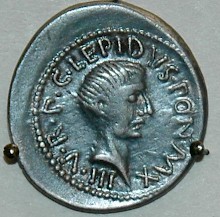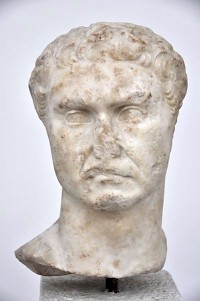Second Triumvirate
Triumvir or tresvir: member of a college of three members. The expression is mostly used to describe the First Triumvirate (60 BCE; Pompey the Great, Crassus, and Julius Caesar) and Second Triumvirate (43 BCE; Mark Antony, Lepidus, and Octavian).

After Caesar had been killed, Mark Antony controlled the republic, but he had to do business with with the assassins, Brutus and Cassius. He made them governors of provinces in the east. However, Caesar's adopted son Octavian thought this was too kind, and exploiting the anger of Caesar's veterans, he launched a war against Antony, who was defeated at Modena in northern Italy. After his victory, Octavian returned to Rome, demanded the consulship, and surprised the world with the creation of an alliance with... Mark Antony. This remarkable volte-face had been designed by Marcus Aemilius Lepidus, like Antony a former general in Caesar's army. He became the third member of the Second Triumvirate, which was recognized in November 43 by the People's Assembly (Lex Titia).

The triumviri rei publicae constituendae ("board of three to reconstitute the state") accepted the powers of a dictator and took several measures
- the execution of 4,700 opponents (e.g. Cicero);
- land bills to give farms to Caesar's veterans (the inhabitants of eighteen cities were sent away from their homes without any compensation);
- war against Caesar's murderers, who were defeated at Philippi;
- measures against the Senate, including the appointment of all magistrates.

Those opposed to the regime found refuge at Sicily, where a son of Pompey the Great, Sextus, organized resistance. In 36, he was defeated in a naval battle by Lepidus and Octavian (and Octavian's admiral Marcus Vipsanius Agrippa), and Octavian proceeded to strip Lepidus of his powers.
Mark Antony, who was in charge of the east and had fallen in love with Cleopatra, was defeated in 31 in the naval battle of Actium. From now on, Octavian was sole ruler; from 27 on, he called himself Augustus ("the exalted one") .
The most impressive account of these years is the History of the Civil Wars by Appian of Alexandria, arguably the most underestimated historian from Antiquity.